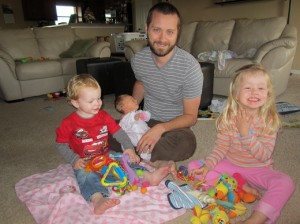There’s nothing like young children to make sure their parents and grandparents are accountable to the truth. When we read them a story and try to shorten it by skipping a few words, they interrupt and point out we missed a line. If we promise to play hide-and-seek as soon as nap time is over, they don’t forget. And when we say we love them, they’re watching continually for a demonstration of that.
These dynamics are probably part of God’s teaching of parents and grandparents, this accountability-to-children factor. It becomes ongoing motivation for us to practice living responsibly. An added dimension of this is that God wants us to act with similar accountability toward him. Interestingly, sometimes he prompts it exactly as children do.
“You haven’t told the whole truth,” he tells us, “so your lie-of-omission will come back to bite you.” This echoes a preschooler’s comment, “You skipped a line of the story.”
Or God might say, “Didn’t you promise to talk to me at the beginning of each day?” When we promise, we should follow through… like we do with that hide-and-seek game after naps.
And just like little ones watch for our loving behavior toward them, God longs for that from us, in response to him.
Young children seem to love their parents no matter what. They generously give them the benefit of every doubt, even when parental behavior is neutral toward them or, amazingly, even when it’s abusive. Some of it might be need-based since they have no one else to turn to, but there’s also a component of brightly-burning hope that refuses to be snuffed out by contrary circumstances.
These two relational pieces, loving no matter what and brightly-burning hope, are also present in our bond with the Lord. When our behavior isn’t loving toward him or even borders on abusive, his response is still, “I’ll love you no matter what.” Additionally he sets up unnumbered opportunities for us to demonstrate our love to him, having a brightly-burning hope that our actions will reinforce our words.
God consistently uses earthly parenthood as a biblical image of his relationship with us, attempting to eliminate some of our confusion about him. He encourages us to call him “Father” and expects human dads to be ongoing models in relating to their children of how he treats them.
But God knows that’s a tall order. Just stretching toward it is all any parent needs to do to bring delight to the Lord. Although we ought to read the whole storybook, play that post-nap game, and act consistently in love, we can’t always do it.
When that happens, God understands. But he also hopes we’ll keep on trying.
“Your love has meant hard work, and the hope that you have in our Lord Jesus Christ means sheer dogged endurance in the life that you live before God, the Father of us all.” (1 Thessalonians 1:3)


